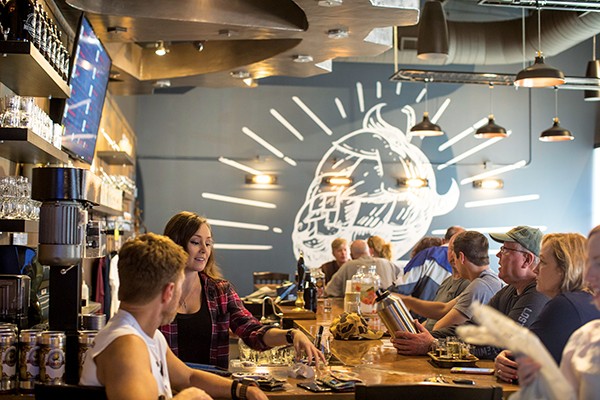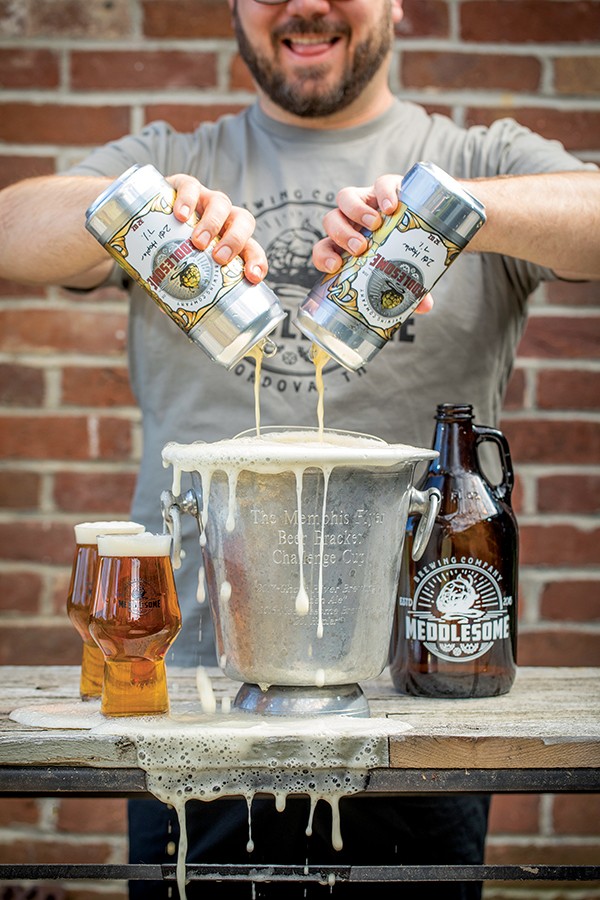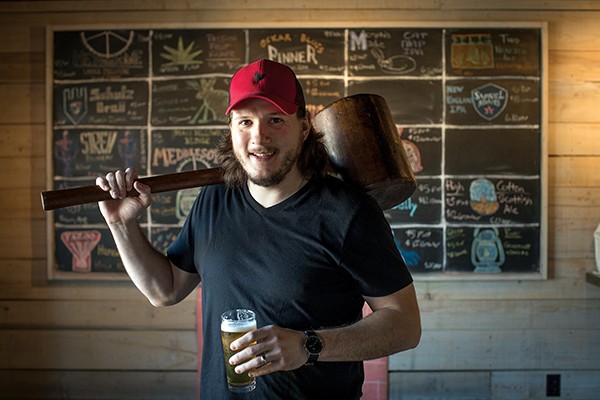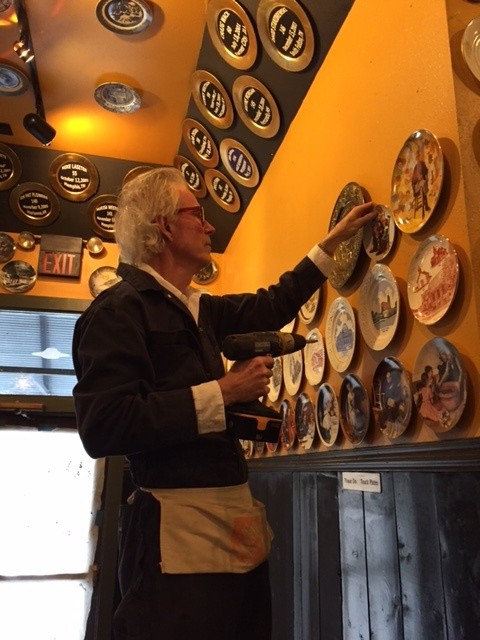Meddlesome Brewing’s 201 Hoplar is the best beer in Memphis, according to the 2,344 voters in The Memphis Flyer & Aldo’s Pizza Pies’ 2018 Beer Bracket Challenge.
Meddlesome is a relative newcomer to the Memphis brewing scene, a plucky upstart from the Dirty ‘Dova. Oh, wait, Dirty Dova is another Meddlesome IPA. We are here to talk about 201 Hoplar, the IPA that won Memphis hearts — and the 2018 trophy.
The 201 Hoplar IPA is “everything Memphis is,” according to Meddlesome. It’s “strong, flavorful, and an unforgettable experience.” Dosed with chinook and Columbus hops, the beer is “oozing with resin, pine, grapefruit, and ripe pineapple.”
Meddlesome owners Richie EsQuivel and Ben Pugh created 201 Hoplar to “be exactly what a West Coast IPA should be.” It’s not “over-the-top bitter” on the front end, and the slightly fruity flavors roll in right after that for an accessible, easy-drinking IPA.

The kings of Memphis beer are Meddlesome Brewing Co.
Meddlesome opened last year in Cordova, just a stone’s throw from the Shelby Farms dog park. But their fans hit our poll with enthusiasm and pushed 201 Hoplar past many Memphis craft beer powerhouses.
The brewery is a dream project for EsQuivel, a former brewer at Boscos Brewing, and Pugh, a former brewer at Rock’n Dough Pizza & Brew Co. Rising to the top of the bracket so fast was surprising to Pugh, but a welcomed surprise.
“It’s taken us aback, honestly,” Pugh said. “We’ve only been open about eight months, and we did not expect it. Once we saw we’d made it to the finals, we were pumped that we’d even made it that far.”
Our trophy — the VanWyngarden Cup (so named because it’s an old ice bucket that the Flyer editor donated) — has rested in a place of honor for the last year. Wreathed in a crown of hops, the cup sat high above the beautiful taproom bar at Ghost River Brewing Co. That company’s classic golden ale, simply called Gold, won our inaugural challenge last year.

“We had a great year, showing off the trophy and being the King of Memphis Beer,” said Suzanne Williamson, Ghost River’s vice president of marketing, giving a nod to the headline of our cover story last year.
Williamson said Ghost River had fun with the bracket again this year and plans to bring the trophy back to “its true and rightful home,” next year.
The Flyer‘s Beer Bracket Challenge was broken up into four categories — light beer, dark beer, IPAs, and seasonals. We asked our breweries to submit their beers in those categories. Beer lovers know the bracket categories are broad. Dozens of different beer styles reside in each one. We wanted to meet Memphis beer drinkers where they were. Our beer scene is growing and so are the palates of Memphis beer drinkers. (See our story.) As our scene changes, so, too, may our bracket.
In the meantime, we knew, for example, that a Kölsch couldn’t (and shouldn’t) compete head to head with a different style, like a pilsner. So, to ensure some kind of objectivity, I pulled an Aldo’s Pizza Pies staff hat over my eyes and blindly picked the match-ups out of a cup. And I did it on Facebook Live. Drinking beer, talking beer, and looking silly on the internet? It was a dream job no one ever told me existed.
With the bracket set, our voters did the rest. Hundreds of votes were cast during each round, for a final total of 12,837 individual votes (with about 1,000 more voters than last year).
On its way to the top, 201 Hoplar defeated Boscos Restaurant & Brewing Co.’s legendary Hop God in the first round of IPA voting. Voters floated it through two more rounds, besting High Cotton’s amazing IPA and Wiseacre’s heavyweight Ananda.
In the Final Four, 201 Hoplar faced Wiseacre’s Tiny Bomb, which might be considered the Michael Jordan of the Memphis beer market, but they pulled off the upset of the tournament. In the end, 201 Hoplar faced Wiseacre’s Astronaut Status, a barrel-aged Imperial stout out of the seasonal category.
Except for the IPA category, Wiseacre dominated this year, winning the other three categories: Tiny Bomb in light, Gotta Get Up to Get Down in dark, and, of course, Astronaut Status in seasonal.
It should also be noted that newcomers Crosstown Brewing fielded a team of four beers at the same time they were opening their brand-new brewery close to (you guessed it) Crosstown Concourse.
Owners Will Goodwin and Clark Ortkiese joined us for a brief talk during our Facebook Live event at Aldo’s. The guys are passionate. The brewery is massive, and the beers are good. Look for Crosstown to show up bigly on next year’s bracket.
Yes, we know we’re not the first to “bracket-ize” beers. The idea has been used in other alt-weeklies around the country. Heck, the Memphis Craft Beer blog ran Malt Madness in 2015. Consider our hats tipped all around. Job One with this bracket was to have fun. Beer is fun, and we wanted to have fun with beer. Basketball fans get a bracket every year. Beer drinkers should have one, too.
What we never want to do with this bracket is to make it seem like Memphis breweries are seriously pitted against each other. Sure, they compete, but from the stories I’ve heard, brewers and breweries in Memphis help each other out, trading knowledge and equipment and drinking each others’ brews. We are not creating some fictional friction. Again, we’re just having fun.
Whether you like bracket contests or not, remember: The best beer in Memphis will always be your favorite.
The Memphis Beer Scene
The Memphis brewing scene is continuing to grow and change. Two new breweries have recently opened — Meddlesome and Crosstown Brewing. Other new beers enter the Memphis market all the time from regional craft breweries like Devil’s Backbone Brewing and Green Flash Brewing (both from Virginia) or Perennial Artisan Ales out of St. Louis.
Consider this a sort of “State of Memphis Beer” story. I talked with folks at the city’s big draft houses — the Flying Saucer, Young Avenue Deli, and Hammer and Ale — beer people who have been watching the scene here for years. I also got some insights from two people who helped shape the Memphis craft scene and have started new careers as sales reps for out-of-state, regional brands.
There is now a “great flood of folks thirsty for craft beer” pouring into the downtown and Cordova locations of the Flying Saucer, says co-founder and beer expert Keith Schlabs. While the Saucer concept was embraced when it opened in May 1997, craft beer wasn’t an easy sell.
“We had 80 taps full of offerings, many of which were available to the people of Memphis for the first time,” says Schlabs. “However, we were battling the ‘bitter beer face’ campaign, where anything that wasn’t a mass-produced adjunct lager or a light lager was ridiculously painted as ‘bad beer.'”
Bitterness wasn’t understood, making it hard to sell hop-forward styles like pale ales and IPAs, Schlabs says. Even filling the Saucer’s massive tap wall was a challenge. Rogue, Anchor, and Breckenridge dominated its 80 taps, and the rest were sourced by Gene and Steve Barzizza and the Memphis team at Southwestern Distributing.
But the Saucer persisted and “we saw rocket growth once the craft beer movement kicked into high gear,” Schlabs says. “Some thought this was a fad, but we knew it was not. Small brewery tap rooms are growing and this could impact our growth.”
When Tessa Pascover, general manager of the Young Avenue Deli, started as a waitress in 2010, Budweiser, Bud Light, Michelob, and Killians still had spots on its draft wall. Craft beer now dominates its 35 taps with one exception, Pabst Blue Ribbon.
“Nowadays, after what I call the ‘hand-crafted beer revolution,’ there’s a new brewery that comes to town and new breweries [at the Deli] all the time,” Pascover says. “There are a ton of new options, and it’s just a really exciting time.”
In 2013, local brewers High Cotton, Memphis Made, and Wiseacre opened within six months of each other. It was a sort of explosion for Memphis beer, first ignited by here by Boscos and Ghost River. That new growth was an inspiration for Kevin Eble and David Smith, who opened what was then called The Growler in Cooper-Young. At the time, most Memphians didn’t really know what a growler was. The name was changed to Hammer & Ale, but the core mission — a focus on craft beer — remained the same.

Kevin Eble hefts a giant mallet and a hand-crafted pint at Hammer and Ale.
“Our whole thing is that you can come in and get everybody’s stuff,” Eble says. “The breweries, obviously, are limited [to their own beers] but we’re lucky enough to sell everybody’s beer. People started grabbing onto it pretty quickly and accepting craft beer as something important.”
When Memphis offerings changed, so did its beer drinkers. Civic pride in local brews swelled. You can drink Memphis beer in Memphis like never before. With brewery taprooms, you can consume a local brew steps away from where it was born. It doesn’t get more local than that.
Taylor James helped found and form the Madison Growler (the growler station inside the Madison Cash Saver) and make the grocery store a craft beer destination. He’s seen first-hand how Memphis beer drinkers’ tastes have become more sophisticated.
“Sour beers were something that, four or five years ago, you would have put in the Memphis market, and it would have just sat there,” James says. “People would have been like, ‘You’re trying to sell me something that’s sour?’ Then I would’ve explained that it’s not like sour candy but it’s because brewers put bacteria in the [beer]. Then they’re down the aisle running away from you and looking for something else.”
But if you were drinking beer last spring and summer, you know that sours were “the thing.”
So, how did Memphis beer drinkers evolve from “Lite” drinkers to appreciators of, say, a bacteria-borne sour beer? For Cory York, formerly with Ghost River, it comes down to education.
“People in Memphis are figuring out what craft beer is,” York says. “It’s mainly word of mouth. It’s that tried and true story … ‘I had a buddy pressure me and here I am.'”
“The local breweries had a big impact,” Pascover says. “The college crowd were always the domestic beer drinkers, and they didn’t really know about [craft beer]. Now, they come in and they want a Wiseacre or a Ghost River. The local breweries have definitely developed the local market.”
“Memphians realized they didn’t have to be pigeon-holed into a pilsner,” Eble says. “You can move into a pale ale with some hops in it or a stout or something dark or barrel-aged. It’s a progression of taste. You start seeing funky things like sours staying on the market because people’s tastes have changed.”
But Schlabs says beer drinkers here (like drinkers in most markets) still want session beers. “People want that yellow, fizzy pint at the end of a long day of work,” he says. “It’s our mission and duty to make sure that that yellow, fizzy pint is something that’s consistently well-made by someone who has worked their butt off for craft beer, someone who needs our business and someone we want to support.”
Memphis has seven independent companies brewing beer: Boscos, Ghost River, High Cotton, Wiseacre, Memphis Made, Meddlesome, and Crosstown. Nashville has about 20. Little Rock has seven or so, and the state of Mississippi has about 18, according to Beer Advocate. But do numbers like that really matter?
Not according to Taylor James, who became a sales rep for San Diego-based Ballast Point Brewing last year. “San Diego,” he says, “has about 150 breweries, and all of them are good. Memphis has come a long way, but there is still a long way to go.”
At the Saucer, Schlabs says his crew is still pushing beer drinkers to discover new tastes — to attract new craft fans and keep the old ones interested. “The onset of fruited, tropical IPAs is a good example of the industry making efforts to appeal to an extended range of palates,” Schlabs says.
Pascover says the Deli is riding the craft beer trend and is constantly looking for the next great beer. She remembers when IPAs where the thing, then it was sour beers, and “last year it was fruit in beer, like watermelon-lime pilsner, or raspberry truffle stout, or a pineapple passion fruit IPA. This year its going to be hazy, juicy IPAs, filled with fruit.”
Eble believes the Memphis craft beer scene still has a lot more room to grow. “Consumers have been exposed to craft’s panoply of flavors and nobody is going to say, ‘Well, I’m going to start drinking Bud again.'”
But the “craft beer” scene of the past changed significantly when macro breweries (like those who make Bud, Miller, and Coors) started snapping up smaller breweries, scaling up their production, and shipping those “craft” brands into markets like Memphis. Crafty-looking brands like Goose Island, Elysian Brewing, or Lagunitas may look like they were made at the cool brewery down the road, but their owners are likely jet-setting hedge fund managers.
“This [craft beer] heritage we’ve spent so many years to build is being threatened,” Greg Koch, co-founder of craft beer stalwart Stone Brewing, said in a recent video. “Big beer [sales have] been flat or declining and they’ve gone out in the craft world and made acquisitions.” So now, “craft” breweries is the preferred nomenclature for locally owned, hands-on companies like High Cotton or Wiseacre, and independents are opening like crazy.
“I believe the number I heard was a new brewery opens in America every 11 hours now,” says Schlabs. “When we started Flying Saucer in 1995, there were 2,000 or so, and now there are over 7,000. Too much of a good thing can start to be bad.” But that’s not a concern in Memphis, yet.
“I don’t think we’ve plateaued in Memphis by any means,” says York, now a sales rep with Hattiesburg-based Southern Prohibition. “The more breweries that pop up, there is going to be more competition. You’re going to start to see breweries realize the other steps they need to take to compete.”
James says education will continue to be the key. But craft breweries like Ballast Point are also beginning to make beers that meet entry-level consumers at, well, the entry levels — with light pilsners and lagers.
The best ingredient for Memphis beer is always going to be Memphis, says Eble. “The local stuff is better because you know the people who made it, and you know where it was made. That’s better than some guy at Budweiser just following a recipe.”
